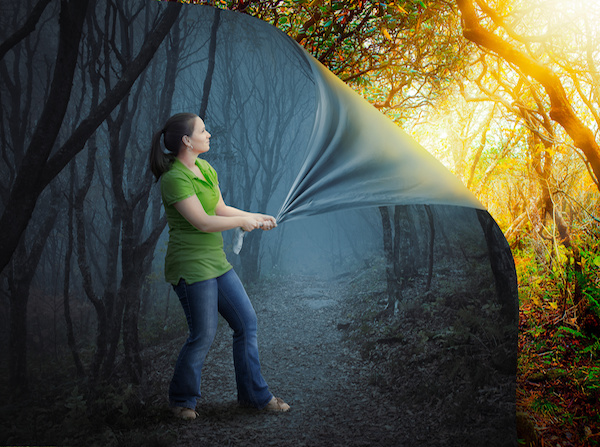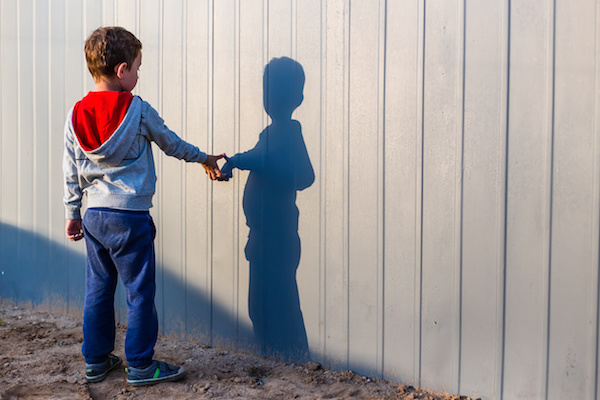There are all types of lights and shadows in our lives. As I mentioned in my last newsletter, there is an actual physical light and shadow sequence that affects our lives.
The warmth of the sun and protection of darkness can change our moods. Extended times of shadow may even dampen our inner light. But what about the darkness and light within ourselves? Exploring our shadows can improve our lives.

Carl Jung Discovers the Shadow
The concept of a dark part of ourselves has long been a fringe idea as part of popular thought. Some experts such as the late Carl Jung said that people cannot be fully integrated without embracing their shadows.
This is an interesting concept that was first introduced to me by Joseph Campbell. He learned about the shadow from psychologist Carl Jung. As he stated in Psychology and Religion (1938):
“Unfortunately there can be no doubt that man is, on the whole, less good than he imagines himself or wants to be. Everyone carries a shadow, and the less it is embodied in the individual’s conscious life, the blacker and denser it is. If an inferiority is conscious, one always has a chance to correct it. Furthermore, it is constantly in contact with other interests, so that it is continually subjected to modifications. But if it is repressed and isolated from consciousness, it never gets corrected.” ― Carl Jung
Freud Had Different Ideas about Exploring Our Shadows
Sigmund Freud, who is not as popular as he once was in the discipline of psychology, put forth a tidy way of approaching our self-concept when it comes to light and shadow.
He theorized that each of us has to struggle between the ID,(perhaps our shadow), the Ego ( our edited self), and the Superego ( the light) which is our higher self that monitors and mitigates the id. According to Freud, the “ID’ is our baser self.
The id is motivated by appetite; it wants what it wants and acts solely on impulses and to satisfy itself. It is selfish and thoughtless. The superego monitors the Id, and the Ego is the result of this struggle.
We need to remember that we are capable of anything given the circumstances. In George Bernard Shaw’s play, Pygmalion, when Dolittle who is a dustman (garbage collector) was asked by the professor, “ have you no morals?” he replies, “no sir, can’t afford them.”
So the struggle is probably simpler than Freud posited, however it can feel quite complex when we first go digging around inside ourselves.
Why do We Often Decide not to Explore Our Shadows?
The bottom line is that we start repressing parts of ourselves from a young age, some say even before the age of six. In many spiritual traditions, self-realization is one of the highest pursuits. This is a process that is ongoing and takes a lifetime for most people, but the rewards including meaning and fulfillment can be tremendous.

This initial aversion, often coming from social conditioning, can be tough to overcome. The important part to remember is that it is a process, and you can go as slowly as you want. Getting to know your darker side is part of this process, and there are many ways to proceed.
As I have learned, poetry can be a great tool for helping us unlock our hidden dark sides so that we can be better integrated human beings who ultimately live more fulfilling lives. I also think that meditation and other forms of introspection can prove quite useful.
Exploring our Shadows Could Help Ward-Off Depression
As mentioned, for many of us, learning to know ourselves is a lifelong occupation. It can be tricky not to distort your self-perception. If we distort it too much towards the good, we risk being a narcissist, and if we distort too far towards the negative, we risk depression.
One might consider that Jung didn’t mean we have to acknowledge and root out our evil side. He may have meant that we experience a range of emotions. Sadness, as well as joy, and the entire spectrum is to be explored and understood as part of life.

That is also what Campbell says about a question that he was allowed to ask of a highly regarded Buddhist luminary. Campbell asked him if life is both good and evil, sadness and joy, and other such seemingly paradoxical dualities. The master replied that we must embrace and say “yes” to all of it, including the darkness. And that is a great part of the possible benefit of exploring our shadows, the ability to say “Yes!” to all aspects of this existence.
Life is filled with opportunities to get to know ourselves better. The deeper we look, the more we find. Many people are terrified to go spelunking into the dark crevices of their soul because they are not sure what they will find. But is it not better to explore and understand who we are, make peace with the darker materials, and then integrate them so we can become more whole?

Getting to know your shadow can be scary, and it is not something we dive into willy-nilly. This is not a short process; for most people, it takes a lifetime. But I believe a little curiosity and introspection can go a long way to living a more fulfilling life. Are you ready to take the leap? If not, what’s holding you back?
0 Comments